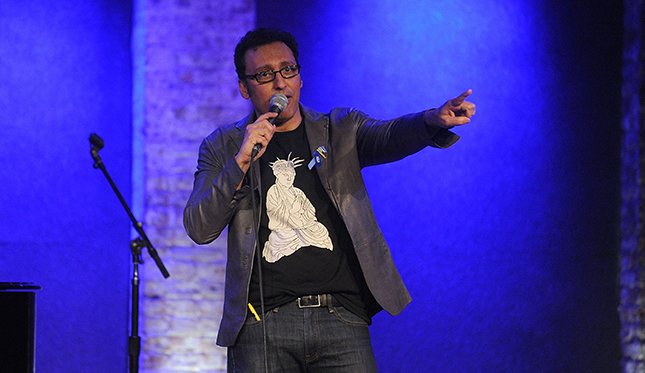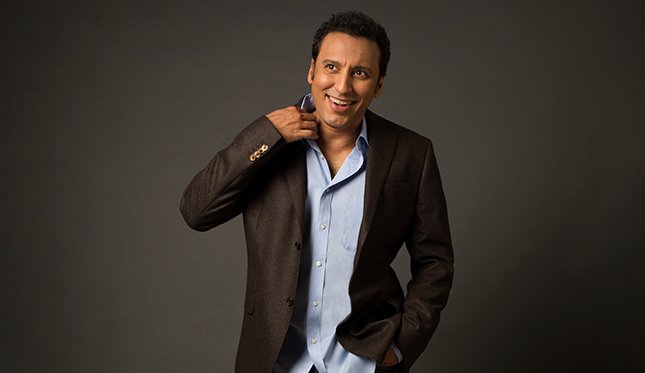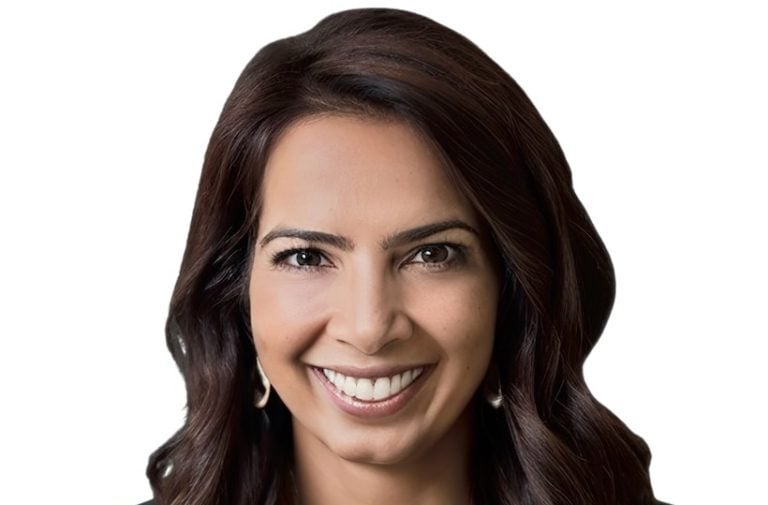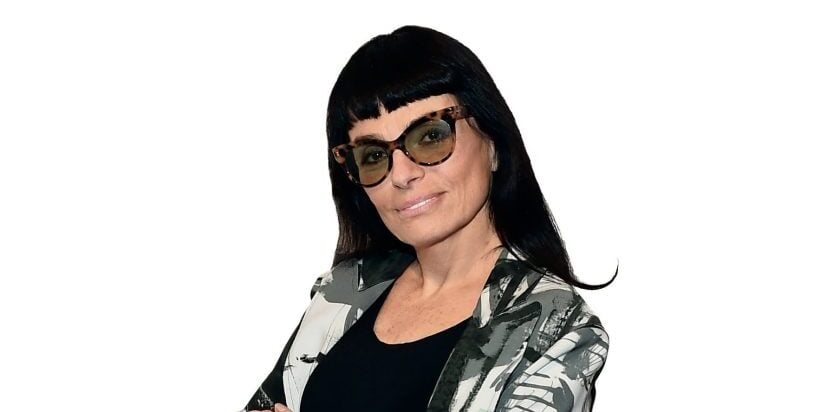When Aasif Mandvi, bedecked in work boots and a tan cardigan, strode onto the stage at the City Center theater in New York last fall, he looked like he was in need of a field of heather to stomp through. In other words, he fit in perfectly in the theater’s revival of the classic 1947 musical, Brigadoon. Naturally, the original staging of that play, set on the Scottish Highlands, didn’t feature an Indian American, Muslim actor as one of the leads—that kind of diversity on stage would have been unthinkable 70 years ago. Even 20 years ago, when Mandvi was getting his start, it would have raised eyebrows. The fact that it doesn’t now can at least in part be attributed to Mandvi’s success and entrepreneurial drive, both on stage and screen. “I’m someone who has been fortunate to have multiplicity. I’ve gotten to wear many hats in this business,” Mandvi says.
Mandvi, 51, was born in Mumbai, India, and lived in the UK before immigrating to Tampa, Fla., in 1982 when he was 16. His first entertainment gig was as a cast member at nearby Disneyworld, and he soon moved to New York to study acting under legendary instructor Wynn Handman. But although he had talent, he found the roles available to him limited to stereotypes: shopkeepers, cab drivers, delivery guys.

“We met doing murder mysteries together,” Connie Britton, another student of Handman’s, recalls of Mandvi. “We would get together with this troupe of actors and go to where there was a party going on, say in an Elks Lodge, and the people at the party had been promised a murder mystery.” The actors had to blend-in organically with the party goers. “My job was to fall over, because the woman was always the victim,” Britton says. “And Aasif was always a delivery person.”
Thinking back on the early years of his career and fighting to get real roles, Mandvi relied on his experiences as an immigrant. “As a kid and I think even as an adult, there’s always a feeling of being the outsider, and when you are the outsider, you develop skills in order to fit in,” he says, wearing a News Hour with Jim Lehrer ball-cap and sipping a coffee in a café in New York’s Chelsea neighborhood. “It goes back to earlier, figuring out how to fit in, figuring out how to be as good at this game as all the white people are.”
Up until very recently, there were few South Asian characters in movies or TV, and those that did exist—such as the heavily accented convenience store owner Apu, voiced by Hank Azaria on The Simpsons—were gross stereotypes. But with the emergence of Hassan Minhaj, Aziz Ansari, Dev Patel and Kumail Nanjiani as superstars leading their own movies and shows, there is clearly growing acceptance of South Asian actors and comics, something which can at least in part be attributed to Mandvi’s earlier successes. (Kal Penn of Harold and Kumar fame also played a part in popular acceptance of South Asian actors around the same time.)

While most people now know Mandvi as a comic from his years as a correspondent on The Daily Show with Jon Stewart, or perhaps as the lead actor, producer and co-writer of HBO’s The Brink, (“We were so prescient—what’s happening right now is exactly what The Brink was talking about,” Mandvi says), he began his career as a serious actor.
Mandvi’s breakout role was a one-man show which he wrote, Sakina’s Restaurant, for which he won an Obie Award. His purpose in writing the play was to create a serious role he could really inhabit, since the industry overall wasn’t providing them. Since then, he’s performed in Oklahoma! on Broadway, Tony Kushner’s Homebody/Kabul and in the Merchant Ivory film The Mystic Masseur. He had not tried his hand at comedy until The Daily Show with Jon Stewart called him to audition in 2006.
“Jon looked at me and said, ‘He’s not your typical comic that we see all the time. This guy’s an actor,’” Mandvi recalls. Part of why he took the Daily Show job, Mandvi wrote in his 2014 memoir No Land’s Man, was that Stewart did not expect him to do an accent. Of course, he took the gig and then spent the next six years as the show’s “senior Asian correspondent,” “senior Middle East correspondent” and “senior Muslim correspondent,” playing against the stereotypes that came with being Muslim and South Asian. And because of the show’s satirical intent and engagement with serious political and social issues, Mandvi became increasingly political in his thinking about entertainment. Since Mandvi’s departure from the Daily Show, he created Halal in the Family, a critically acclaimed, Peabody Award-winning comic web series about a Muslim family dealing with the casual racism of an American suburb, which co-starred Sakina Jaffrey.
“There’s a part of me that’s an activist. There’s a part of me that’s an artist.”

With the election of Donald Trump as president, Mandvi has become even more vocal about his politics, hosting the 2017 Deportation Jamboree to put a comedic focus on immigration issues while raising money for the ACLU. “I don’t mind being a representative of South Asians or Muslim Americans, if that’s what people need me to be,” Mandvi says. “I’m trying to write things now that have a social awareness. There’s a part of me that’s an activist. There’s a part of me that’s an artist. A part of me that’s dramatic and a comedian.”
The various threads of Mandvi’s life—his identity as an immigrant and Muslim trying to fit in, his engagement with politics and social issues that began on the Daily Show, his twin personalities as a serious actor and a comedian—are coalescing now. In October, at the Asia Society’s annual gala, Mandvi presented the Asia Game Changer award, which he had won in 2015, to Dev Patel, one of the score of prominent South Asian actors and comedians who have emerged in the years since Mandvi broke through on The Daily Show. When the two worked together on The Last Airbender, a commercial and critical flop from director M. Night Shyamalan, Mandvi told the audience at the Asia Society that he realized Patel was “a deeply thoughtful and passionate young man who, while in the middle of a whirlwind of success at a young age, still wanted to make choices that would help highlight the important issues in the world.”
In response, when Patel took the stage at Cipriani Wall Street, the headquarters of the old Cunard Line which brought countless immigrants to New York City in the 19th century, he talked about the actors who had come before him. “I feel a bit of impostor syndrome, following such incredible individuals,” Patel said. “I really wanted to represent not just Indian men or British actors, but people of all colors and races and classes, not just in the arts but in any occupation where it feels difficult to get a foothold…to all those millions of kids in the slums of India who stay up late watching YouTube clips of Jackie Chan or Shah Rukh Khan, hoping to learn.”
Mandvi, for his part, is keeping busy. Lincoln Center has commissioned him to write a play, and he’s considering doing another one-man show. “There’s this innate fear that I live with which is that I’m an impostor and I don’t know what the fuck I’m doing, all of this is just a fluke and luck and I’ve no business being here,” Mandvi says. Then, with a bit of a grin he adds, “But since I am here, I’m going to try to figure out how to make this good…On one hand, I’m terrified I’m an impostor and I’m a failure. And on the other hand, I really believe I should be playing a superhero.”










